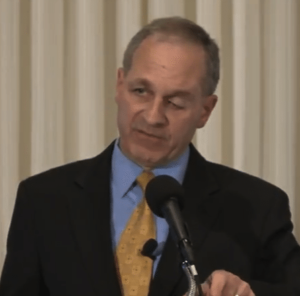Former FBI Director Warns About the Hidden Risks of Drug Importation

Louis Freeh Speaks at "Risking Safety at all Costs"
This editorial by Louis Freeh was published in The Denver Post on April 30, 2019. Louis J. Freeh, former director of the FBI and a former federal judge, is currently chairman of Freeh Group International Solutions.
Guest Commentary: Importing foreign prescription drugs needs proper oversight that Colorado can’t provide
As law enforcement officials in Colorado know all too well, the second that regulatory oversight over the origin of prescription medicine goes away, Coloradans will be put in a precarious position. This would invariably happen in the event that foreign wholesalers gain access to the U.S. market through proposed initiatives allowing drug importation in Colorado.
At the moment, the “Colorado Wholesale Importation of Prescription Drugs Act” is working its way through the House of Representatives. The bill, subject to federal approval, would grant wholesalers permission to import prescription drugs from Canada for marketing and sale to Colorado pharmacies. Proponents of this legislation, citing rising drug costs, believe it will save the state millions of dollars.
I’ve been working on this issue for decades and I can say without hesitation that foreign drug importation is something that the state must avoid. There are hidden risks and costs associated with the scheme that have not been getting much attention which impact your health and Colorado law enforcement’s ability to keep us safe.
Criminal drug rings are working to infiltrate our drug supply for their own financial gain, often targeting the most vulnerable. A recent report by leading researchers and experts found that counterfeit medicines kill more than 300,000 kids worldwide every year. In 2017, the World Health Organization estimated that the counterfeit drug trade generated $30 billion in profits annually. It’s all about money and harm to these criminal organizations.
Could Colorado lawmakers guarantee drug safety? The answer is “no.” Take the case of CanaRx, an online broker selling to hundreds of American cities and private companies, recently warned by the FDA for selling “unapproved, misbranded and unsafe imported drugs to unsuspecting Americans.” A nice word summing up the FDA’s legalese is “counterfeit.”
The human stories are heart-wrenching as well. In 2011, during treatment for lung cancer, Betty Hunter, a grandmother in Arizona, was given what she and her doctor believed was Avastin, a cancer medication. Instead, and thanks to the online pharmacy giant CanadaDrugs.com, what Betty was actually ingesting was medication labeled Altzuan, a Turkish version of Avastin.
Altzuan, of course, was a fake medicine. It was only tap water and mold. Betty got very ill. She would eventually succumb to lung cancer, leaving loved ones to wonder how much longer she could have lived if not for the break in treatment, thanks to the fake medicine.
Recently, I had the chance to meet Carrie Luther, a California resident and proud mom who lost her son, Tosh, to a fake Xanax made with fentanyl. Tosh took the medicine a friend gave him to help him sleep, not knowing that he would never wake up again.
As evidenced by the opioid crisis and fentanyl-related deaths, counterfeit drugs also prove incredibly burdensome for law enforcement, who now have to scramble resources to deal with burgeoning black markets and the associated crimes that proliferate around this lucrative business. In a “closed” drug system, where the FDA has heavy regulatory control of what is manufactured and how drugs are marketed, these second and third-order effects are minimized.
In 2017, my team and I conducted an analysis of the gaps in the current system. We found that the United States does not have the resources or infrastructure in place to guard against dangerous counterfeit medicines should drug importation become law. In our report, paid for by the Partnership for Safe Medicines — a multi-stakeholder organization that includes patient advocates, pharmacists, law enforcement and the pharmaceutical industry — we recommended a series of steps be taken, with a focus on providing law enforcement with the resources and expertise it needs to address the current challenges.
Finally, there are clear taxpayer costs associated with Colorado’s drug importation proposal. The program itself is projected to cost the state $2.7 million to establish. I emphasize projected because, with the exception of Vermont, no state in the union has undertaken such a program with federal approval in limbo.
There are a series of options to reduce costs requiring fewer radical solutions than risky drug importation schemes. For instance, reining in the power of pharmacy benefit managers (PBMs), the monopolized middlemen between pharmaceutical companies and the public, are a leading reason drug prices remain high. These companies — and there are only a handful of them — essentially set the prices and the rules of the prescription drug industry. Like New Jersey, Colorado could consider legislation that would create a competitive marketplace for PBMs.
I applaud the Colorado legislature for taking the question of drugs costs seriously. But they have an opportunity to demonstrate they are tackling the problem sensibly, without risking the lives of Coloradans and the men and women who go to work every day to keep them safe. Rejecting drug importation is a necessary step.